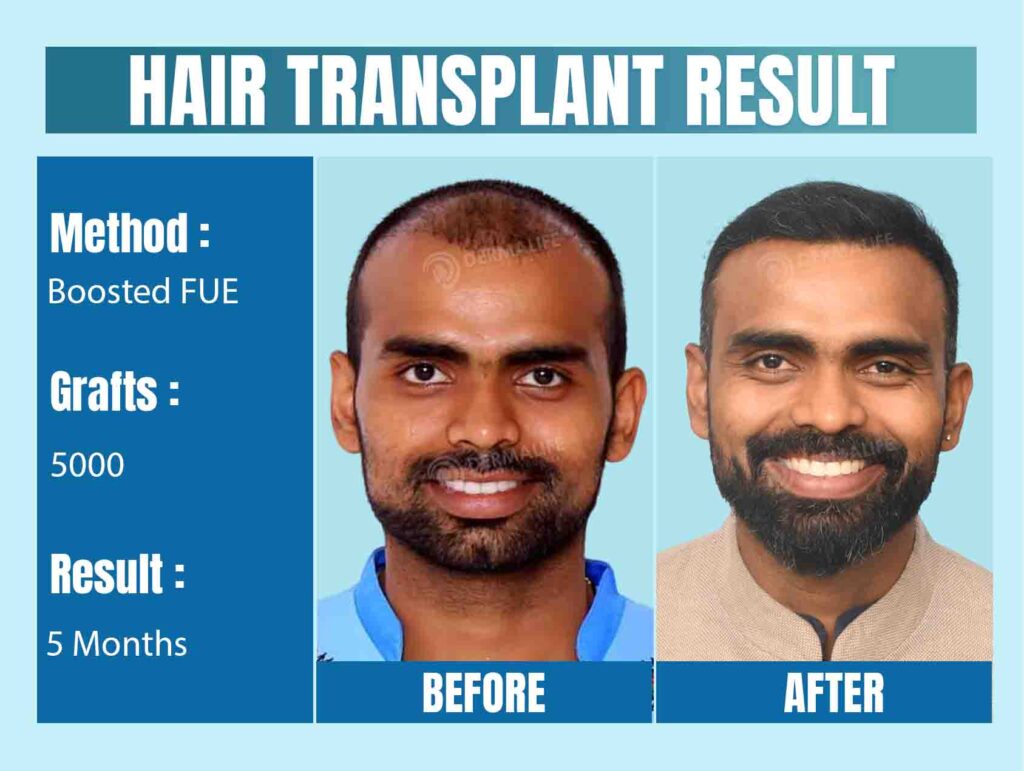
Hair transplant surgery in Delhi is a life-changing procedure for people who are dealing with the continuous emotional distress of hair loss. And after going through all that, what if the results do not come as expected? That is why it is crucial to learn about the hair transplant after-effects.
Understanding the aftereffects can help you manage them. It is the key to a smooth recovery. In this blog, let us explore the seven things you should know about the side effects of a hair transplant.
Hair Transplant in Delhi: Top After Effects You Should Know
The after-effects of hair transplant in Delhi can range from mild to severe. Here we have compiled them for our readers:
Mild After Effects
- One of the most common after-effects is swelling. As you recover from the procedure, you will experience some swelling around your forehead and your eyes. Due to surgery, your scalp will take some time to adjust, and the swelling will subside in 3 to 4 days.
- You can see some crusting and scabbing around your transplanted hair follicles, and the scabs will fall off in 7 to 10 days.
- You can also experience some itching in the recipient and donor areas. It is actually a sign that your scalp is healing.
- Hair in the donor area and the recipient area will fall out after hair transplant surgery in Delhi. This occurs due to shock loss, which is a common side effect of hair transplant surgery.
Moderate to Severe Side Effects of Hair Transplant in Delhi
Hair implant surgery in Delhi is generally safe when performed by qualified professionals. However, like any medical treatment, it may carry a risk of side effects. While most side effects are mild and temporary, it’s important to be aware of the moderate to severe side effects that can occasionally occur, especially if post-operative care is not properly followed.
Infection
Infections are rare but can occur if the scalp is not kept clean after the procedure. Bacteria can enter through the micro-incisions made during surgery, leading to redness, swelling, or pus formation. Fortunately, these infections are usually mild and treatable with antibiotics prescribed by your hair transplant surgeon in Delhi.
Folliculitis
This is a condition where the hair follicles become inflamed or infected, often due to factors like sweat, oil buildup, or physical trauma to the scalp. It typically appears as small, red, pus-filled bumps. Though it may look concerning, folliculitis is manageable with warm compresses, antiseptic solutions, and antibiotics if needed.
Scarring
Scarring is uncommon but possible, especially in techniques that involve larger incisions. This side effect is more frequently associated with the Follicular Unit Transplantation (FUT) method, which involves removing a strip of scalp tissue.
However, at Dermalife Hair and Skin Clinic, we prioritise scar-free, minimally invasive techniques such as:
- Follicular Unit Extraction (FUE) – Individual follicles are removed and implanted without a linear scar.
- Boosted FUE hair transplant – Offers precise placement with reduced risk of scarring and faster recovery.
Thanks to these advanced methods, the risk of visible scarring is significantly reduced.
If you’re considering a hair transplant in Delhi, always choose a clinic that follows strict hygiene standards, offers the latest techniques, and provides personalised aftercare support.
Dermalife is the leading hair transplant clinic in Delhi, and it follows all the stringent hygiene and safety protocols needed during your hair transplant surgery.
Why do side effects happen after a hair transplant?
A hair transplant is a major surgery. Modern hair transplant involves making incisions in the donor and the recipient areas. However, the complete process will trigger the body’s natural ability to heal, and this leads to redness, swelling, and inflammation.
How long do the side effects last?
The duration of the side effects will depend on the expertise of the hair transplant doctor in Delhi. It also greatly depends on your body’s healing mechanism. Here is a general timeline:
- Swelling will resolve in 3 to 4 days.
- Itching can subside in 1 to 2 weeks
- Crusting and scabbing can clear in 7 to 10 days
- Shock loss can last a bit longer, and after 4 months, you can see actual recovery.
Can a hair transplant in Delhi lead to permanent damage?
If a hair transplant is performed in a modern hair transplant clinic in Delhi, you will not experience any permanent complications. But since you are reading this article because you may be opting for the surgery, here are some rare side effects that you must know:
- Excess graft removal or overharvesting can lead to bald spots. This only occurs if you choose an inexperienced surgeon.
- Proper aftercare is very important for your hair to survive. Poor hygiene may cause infections and poor hair transplant results.
- FUE hair transplant does not cause much scarring. But if performed by an incompetent hair transplant surgeon in Delhi, it can lead to damage in the donor area.
Final Remarks
Any cosmetic surgery comes with its own set of complications. A hair transplant surgery in Delhi is no different. However, the complications can be managed if you choose to get the surgery done by an experienced hair transplant surgeon in Delhi.
At Dermalife, we provide cutting-edge technology for natural and long-lasting results. If you are considering a hair transplant in India, book a free consultation with us to learn about the cost of hair transplant in Delhi.
